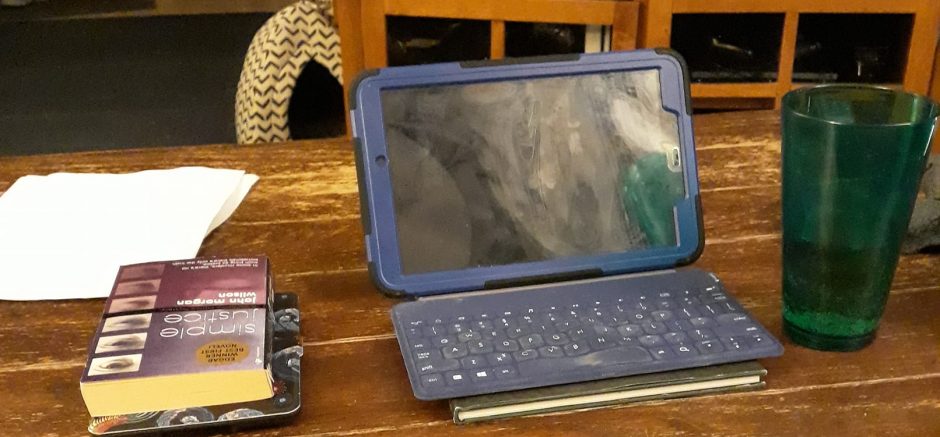Part 1
(I Return In Muck Boots)
Waiting for the slaughter with Ines and her daughter, I have exhausted my Spanish.
They are here to conduct the killings. We are culling our flock.
"Hola. Mi hombre es Dena. Soy un Dena. Mi nino hombre esta Jackson."
Ines wants to know if I speak Spanish. She asks me this in rapid-fire Spanish.
“No.”
“Ah,” says Ines. Ines looks at her daughter. Her daughter asks me something I do not understand. Ines asks me again, for her daughter. She asks me slowly, with fewer words. I still cannot understand.
I try to tell her my son is Puerto Rican and that he is happy to assist with the rooster slaughter. The statement is out of context, in English, and not at all understood. Ines smiles at me.
In Spanish, Ines asks my son’s age. For a moment, I can’t remember. Once I remember, I can’t remember how to say eleven in Spanish, so I hold up ten fingers and then one. In English, Ines says eleven.
Silence comes to silence the little room. We wait for the water to boil so the slaughter can begin. Six roosters are about to die. My first slaughter. Before this, I’ve only seen bugs and one cat die. I look at my hands.
I look at the women’s shoes: Ines in red canvas shoes and her daughter in blue suede sneakers.
I wonder if the blood will stain them. Ines and her daughter are looking at my shoes. They are yellow suede sandals and I know the blood will stain them.
I beg their pardon. I run across the farm into the house.
Part 2
(Language Failed Me and Fails Me Again.)
In shoes that will repel blood splatter, I return to the shed.
Rooster number one, head honcho, is already dead.
I don’t mourn him. He singled me out for the first attack last fall. Many others were attacked by him after me, but he took me first.
He got me by the mailbox from behind, mounting me like he’d mount a chicken and leaving a permanent scar on my back. My third scar ever, only.
I am new to the country. I was a suburban girl. These are my first chickens. These are my first woods, my first closed-in sky, my first rainforest. I had no bearing. I asked why.
Did he think I was a chicken? A coyote? Another rooster?Did he know I said I thought he moved like an insecure Mick Jagger?
“Yes.”
Rooster, strut no more.
The chicken yard is a war zone when there are too many roosters. They rape like it’s a war crime.
Bosnia. Congo. I can hardly look. They don’t stop. They mount and mount, leaving bald spots and scars on the backs of the female chickens.
I think of the poultry world, in which birth control means killing the men or smashing eggs or slaughtering hens. I think of the human world. I think, “We all are made of stars.”
One down.
I’m less relieved and more saddened when the big, sweet, golden one goes. Ines takes a broom and places his neck beneath it. She steps on the handle on either side of the neck. She pulls the rooster’s body away from its own handle-trapped head until the rooster stops screaming.
Snap. He slowly stops flapping. He has stopped his fighting.
Two down.
Three.
Number four, the rooster that looks like a turkey vulture, doesn’t die right. The broom doesn’t snap his neck. It kind of injures it and there is blood and the rooster screams. Panic fills the the shed. We don’t want the roosters to suffer. This is an organic farm. We have to kill them to protect the flock but we don’t want them to suffer any more than their fate strictly requires. His neck is somehow placed back under the broom despite his writhing and rallying.
Snap.
Four down. One to go.
The fifth one gets away–he’s lively. He’s small. He’s the son of the son of a gun that jumped me. They look nearly exactly alike, but Junior has far more spirit. The three of us give chase. I’m no help. The other two corner him. The farmer catches him. The rooster tries to beat him, goes for his eyes. He tries to fly back over the farmer’s head but the long, tall farmer’s arms prevail.
This rooster screams the loudest. Tiniest, but he had the most fight.
Eddie the farmhand says, “Adiós, amigos.”
I think, “Too many roosters are not good for the hens. They eat food and don’t lay. They are extraneous. Every good farm has to cull the flock. It’s not barbaric. This is part of raising meat animals humanely.”
I don’t close my eyes or scream. I only imagine myself doing it.
Ines. Broom. Snap.
Five.
It is done. The cleaning starts. The boiling water is used. The feathers are pulled out. Ines and her daughter held the roosters like babies. The farmer did too. I have a photograph of him holding one, and there’s nothing but kindness and curiosity in the farmer’s eyes.
You can’t see the rooster’s eyes. I never looked that day at their eyes.
They held them before they killed them to keep them calm. This was not cruel, this slaughter. It was as humane as it could have been but still, I feel tired and go inside, leaving my son to help clean the feathers and butcher the roosters. He goes all the way. I can barely speak. I have barely spoken at all for the past hour. Feathers and cottonwood drift across the landscape as I walk home.
Part 3
(I finish my wine and feel lucky to be alive.)
I’ve never seen anything but a bug killed before.
We didn’t kill them for food. We killed them for being out of place. We killed the roosters for being out of place, but we will eat the roosters.
The boiling water, the feathers, the broom handle–all in their places now. The blood scrubbed up. The roosters are in bits. Looking in the bag of rooster parts, I can’t tell which rooster is which.
I hope I have at least part of the mean one.
Over at the main farmhouse, they’ve already made coq au vin. I ask my friends what I should make. I look for recipes. I decide on Greek style rooster stew. To make a rooster edible, it must be cooked slowly in liquid. Roosters are gamey, tough things. Same dead as living. I use tomatoes, olives, wine, spices and stock. I talk to my Greek friend and tell her my plan while the rooster is simmering. There are claws and even a neck and head in the stew. If I were to try to make a rooster puppet out of these pieces, it would be a Frankenrooster. There are three thighs, one wing, part of a rib, a neck, a head and three claws.
I don’t think the neck will be edible but I use all of it.
My Greek friend is excited and tells her mom about my dinner. She calls me because her mom says, “Serve orzo.” The stew is on the back burner, simmering on low. I drive the 20 minutes to the nearest town and get orzo. I become addicted to orzo for the next ten weeks.
Dinner time. I wished I had a big triangle to ring. I wished I had a long prairie dress and a long apron. I wished my hair was in a bun like Ma’s on Little House on the Prairie. Hell, I wished I had a fantastic Bono lion’s mane like Pa’s.
I wished I had several kids running in, school books hanging off a leather strap, no shoes because it’s warm out and shoes are for cold weather. It’s not even rained here for a couple of weeks. There’s not even mud. I wished for blue tin plates. I pour the last of the wine into my own little glass.
Several of the farm workers come over. They settle in. They’ve already had the coq au vin and are ready to see what’s next. I serve up peas, Greek rooster stew, green salad and orzo.
My son is served some meaty pieces of rooster, but asks for a foot and the neck. He starts trying to bite through the neck. Tim the Woodsman, who lives back in the groundskeeper’s cottage and fixes everything from the greenhouse glass to airplanes, goes sentimental and speaks of his childhood on a farm in the midwest, eating rooster and rabbit and of the wonderful things his mother did with winter squash.
Rooster is all muscle, high in protein at any rate, and our roosters were truly free range. They had never been in captivity of any sort. They had foraged, wandered and battled coyotes their whole lives. They were champions of the flock. Necessary but in the end, expendable.At night they slept in one of the unused greenhouses or roosted up on the second floor balcony of the farm’s old administration building.
The men exclaim over the flavor of the sauce, but no one really likes the rooster. My son and his father claim to, but they look stoic and hardscrabble trying to chew the meat. I stewed it for hours and still, it didn’t precisely melt off the bone. It’s free range rooster. It’s nothing like a frozen chicken breast.
I listen and take in their silence and interest. This is the first time I’ve ever watched roosters and chickens live and grow. They came from eggs laid on the farm. I saw each of them as a baby. I saw them before we could tell their sex. I saw them mount and menace the flock, and felt one mount and menace me.I helped round them up early on, when they were little, crying “Chick, chick, chickens!” Then I helped kill them, and cooked them.
I can’t bring myself to eat the rooster. Maybe next time. The chickens are not pets, because you can’t eat your pets, but my attachment to them boils over, and I detach. I look around me at all these men and think of them being culled. I rear back, shaken.
That’s enough for one day.







Pingback: In A Farm Accident | Dena Rash Guzman
"Just the facts," you say, as if that was easy! That's the hardest thing. Love this: thank you!
Powerful story Dena. It's easy to see the dilemma you faced.
Thank you, Gina. It's just the facts, but I am so new to this kind of life. I am glad you read it and liked it.
Love this! Great storytelling.